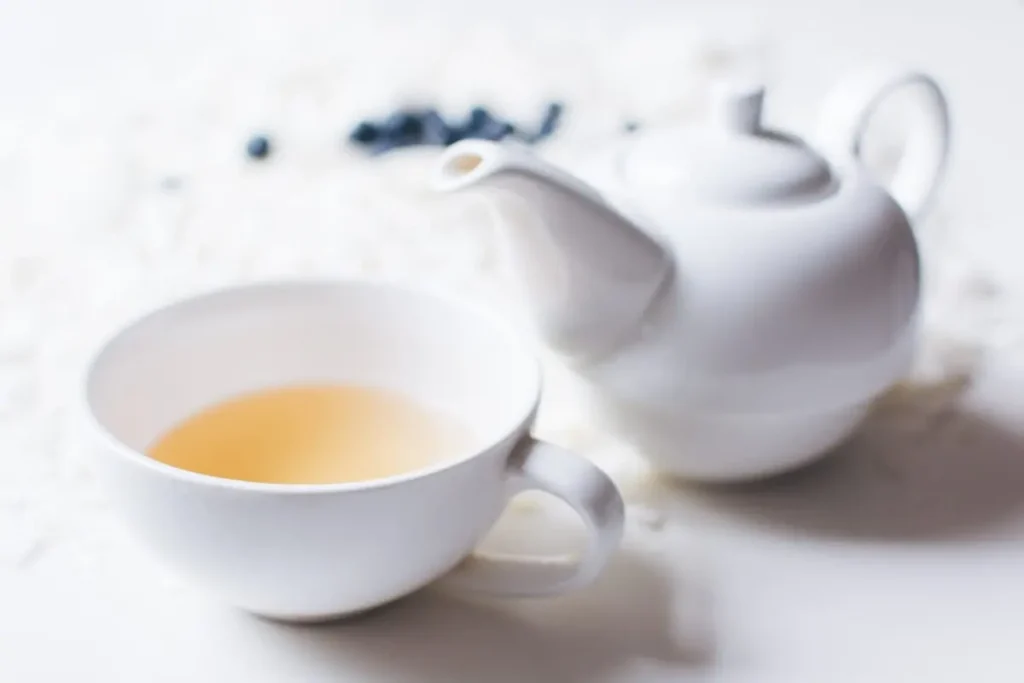Introduction
How Much Caffeine Is In White Tea :Because of its sensitive flavor and potential medical advantages, white tea has as of late acquired fame. Understanding white tea’s caffeine content and its effect on in general wellbeing is fundamental as additional individuals go to it as a better option to other energized drinks. White tea’s caffeine content, medical advantages, blending strategies, most well known assortments, and more will be in every way talked about in this article. Show up with us as we dives into the secrets of white tea.
What Is White Tea?
White tea is a kind of tea produced using the Camellia sinensis plant, like green, dark, and oolong teas .What sets white tea apart is its minimal processing, allowing it to retain a higher concentration of antioxidants. White tea leaves are harvested at a young age and undergo minimal oxidation. This gentle processing preserves the delicate flavors and natural properties of the tea, making it a sought-after choice among tea enthusiasts. In this paragraph you learn what is White tea next you learn How Much Caffeine Is In White Tea.
How Much Caffeine Is In White Tea
Exploring the Caffeine Levels
White tea contains caffeine, albeit in fluctuating sums relying upon variables like the tea assortment, blending time, and water temperature. All things considered, white tea has lower caffeine levels contrasted with dark and green teas. Nonetheless, it actually gives a delicate jolt of energy without the jumpy impacts related with more grounded energized drinks.
Factors Affecting Caffeine Content
Several factors influence the caffeine content in white tea. These include the tea plant variety, the processing method, the part of the plant used, and the brewing technique. While it’s challenging to provide an exact measurement of caffeine in white tea, it generally falls within a specific range.
This ultimate guide give you complete idea bout How Much Caffeine Is In White Tea.
Health Benefits of White Tea
White tea offers numerous health benefits, thanks to its rich antioxidant properties and unique blend of compounds. Incorporating white tea into your daily routine may promote heart health, boost the immune system, and provide other positive effects. If you wanna weight loss CLICK HERE
Antioxidant Properties
White tea is rich in antioxidants, which help combat free radicals and reduce oxidative stress in the body. These antioxidants, including catechins and polyphenols, have been linked to various health benefits, including reducing the risk of chronic diseases.
Promotes Heart Health
Research proposes that customary utilization of white tea might emphatically affect heart wellbeing. The cancer prevention agents found in white tea might assist with diminishing cholesterol levels, lower pulse, and further develop vein capability, in this way bringing down the gamble of coronary illness. Presently you learn befit of white tea and The amount Caffeine Is In White Tea.
Boosts Immune System
The immune-boosting properties of white tea can be attributed to its high concentration of antioxidants and natural compounds. These components help strengthen the immune system, protecting the body against common illnesses and infections.
White Tea Health Benefit
Comparison with Other Tea Types
To comprehend white tea better, it’s critical to contrast it and other famous tea types, like green tea, dark tea, and home grown tea. Every assortment has its remarkable attributes, taste profiles, and potential medical advantages.
White Tea vs. Green Tea
White tea and green tea share similarities but also have distinct differences. While both teas come from the same plant, white tea undergoes less processing, resulting in a milder flavor and a lower caffeine content compared to green tea.
White Tea vs. Black Tea
White tea and dark tea contrast essentially as far as taste, caffeine content, and handling strategies. Dark tea is completely oxidized, bringing about a strong and striking flavor, though white tea is negligibly handled, safeguarding its fragile and unobtrusive flavors.
White Tea vs. Herbal Tea
While white tea is gotten from the Camellia sinensis plant, natural teas are produced using different spices, blossoms, and organic products. White tea contains caffeine, while home grown teas are normally without caffeine, offering an expansive scope of flavors and potential medical advantages.
Brewing White Tea
Step-by-Step Brewing Process
Brewing white tea requires accuracy and tender loving care to extricate the best flavors. Here is a bit by bit manual for assist you with blending an ideal cup of white tea:
- Boil fresh, filtered water and let it cool slightly to around 175°F (80°C).
- Measure the desired amount of white tea leaves, typically one teaspoon per cup.
- Place the tea leaves in a teapot or infuser.
- Pour the hot water over the tea leaves and let them steep for about 3-5 minutes.
- Strain the tea leaves or remove the infuser.
- Pour the brewed white tea into your favorite teacup and savor the delicate flavors.
Best Brewing Practices
To ensure the best brewing experience, consider the following tips:
And you may also known about How Much Caffeine Is In White Tea.
- Use high-quality, loose-leaf white tea for the freshest flavors.
- Opt for fresh, filtered water to avoid any impurities that may affect the taste.
- Adjust the brewing time and water temperature based on personal preference and the specific white tea variety.
- Experiment with different steeping times to find your ideal balance of flavors.
- Store white tea properly in an airtight container away from light, moisture, and strong odors to maintain its freshness.

Popular Varieties of White Tea
Tips for Making White Tea Popular Types of White Tea White tea comes in many different types, each with its own flavor and characteristics. Let’s look at some of the most well-liked varieties of white tea:
Silver Needle (Baihao Yinzhen)
One of the most sought-after styles of white tea is Silver Needle (Baihao Yinzhen). It is just the tea buds, which are covered in fine white hairs that look like silver needles. The flavor of this variety, which has notes of honey and melon, is well-known for its delicate sweetness.
White Peony (Bai Mudan)
White Peony (Bai Mudan) Tea consists of both young leaves and tea buds. In comparison to Silver Needle, it has a slightly stronger flavor profile, with a hint of nuttiness and a subtle floral aroma.
Gong Mei (Tribute Eyebrow)
Gong Mei, also known as Tribute Eyebrow, is a lower-grade white tea made from older leaves. Compared to other white teas, it has a darker color and a slightly stronger flavor. The flavor has honey notes and is earthy and woody.
White Tea and Weight Loss
Exploring the Connection
White tea has gained attention for its potential role in weight loss and management. While it’s not a magic solution, incorporating white tea into a balanced diet and exercise regimen may have some benefits.
Effectiveness as a Weight Loss Aid
White tea may aid weight loss due to its caffeine content, natural compounds, and potential metabolism-boosting properties. It can provide a mild energy boost and promote thermogenesis, which can help burn calories. Now you have some idea about How Much Caffeine Is In White Tea.
Conclusion
This conclusion is about How Much Caffeine Is In White Tea White tea offers a unique and refreshing tea-drinking experience, with its delicate flavors and potential health benefits. With lower caffeine levels compared to other teas, it provides a gentle energy boost without the jitters. Whether you’re a tea enthusiast or looking to explore new flavors, white tea is certainly worth adding to your tea collection. So sit back, brew a cup of white tea, and savor the subtle aromas and flavors that this remarkable beverage has to offer.
Frequently Asked Questions (FAQs)
How does white tea compare to coffee in terms of caffeine content?
White tea generally contains less caffeine than coffee. While the exact amount can vary, a cup of white tea typically contains around 15-30 milligrams of caffeine, whereas a cup of coffee may contain 95 milligrams or more.
Is white tea suitable for individuals sensitive to caffeine?
White tea has lower caffeine levels compared to other caffeinated beverages, making it a suitable option for individuals sensitive to caffeine. However, it’s essential to consider personal tolerance and potential interactions with other medications or health conditions.
Can white tea help improve skin health?
White tea’s high antioxidant content may have positive effects on skin health. The antioxidants help combat free radicals, which can contribute to aging and skin damage. Regular consumption of white tea, along with a healthy skincare routine, may promote a more youthful complexion.
Does white tea contain less caffeine than green tea?
Yes, white tea generally contains less caffeine than green tea. While both teas come from the same plant, the minimal processing of white tea results in lower caffeine levels compared to green tea.
Is white tea safe to consume during pregnancy?
While white tea is generally considered safe during pregnancy, it’s always recommended to consult with a healthcare professional for personalized advice. The caffeine content in white tea is lower than in coffee, but moderation is still key.
Can white tea be consumed cold?
Yes, white tea can be enjoyed both hot and cold. Cold-brewed white tea offers a refreshing and milder flavor profile. To make cold-brewed white tea, steep the tea leaves in cold water for a longer duration, typically 4-6 hours in the refrigerator.
How does white tea taste?
White tea has a delicate and subtle flavor profile. It often exhibits floral, fruity, and slightly sweet notes, with a refreshing and light taste.
Can white tea help reduce the risk of cancer?
White tea’s high antioxidant content may contribute to its potential cancer-fighting properties. However, further research is needed to establish a direct link between white tea consumption and cancer prevention.

